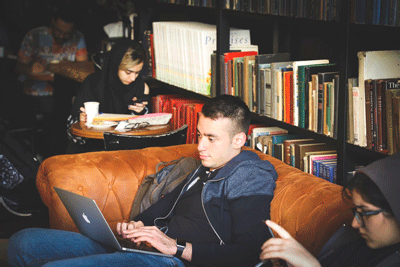Almost two-thirds of children currently in elementary school will end up in jobs that don’t exist yet. That’s why students need transferable, creative skills. Unfortunately, they’re not developing them at school. Hiring managers say current graduates lack critical thinking skills, aptitude with problem-solving and attention to detail. New workers are also short on communication and teamwork abilities.
Students can hone these skills when schools empower them to think like entrepreneurs— by using their knowledge to figure out solutions to real-life problems.
For example, instead of memorizing the names of U.S. presidents, students might pick one president and create a campaign poster, speech, or advertisement to learn how to communicate a key message.
Freelance learning environments teach students how to think critically, collaborate and communicate – the abilities that hiring managers say they’re missing. When college students have application-based experiences like long-term projects or internships, they’re more likely to be engaged at work upon graduation.
Entrepreneurship gives people freedom over their work, which also improves well-being. One study of 11,000 graduates from the Wharton School of Business found that those running their own businesses were happier than graduates in other jobs— no matter how much money they made.
Some schools have embraced entrepreneurial learning. For instance, at the Portfolio School in New York City, teachers give students interdisciplinary projects centered on a theme. One course focuses on how to make ice cream machines. In the process, students learn history by studying how ice became commercialized; science by seeing how states of matter change at different temperatures; and math by measuring ingredients to make their own batches of ice cream.
Other schools enlist outside programs to bring entrepreneurial thinking into the classroom. The Network for Teaching Entrepreneurship partners with underserved schools in cities like Chicago, St. Louis, and Los Angeles to teach students how to build a virtual food truck business or create an app.
To teach students to be adaptable, schools must ensure that the environments in which they learn are adaptable, too— that they reflect the real world. One idea that’s taking hold is the “makerspace”— a studio-like classroom designed so kids can learn by doing. A makerspace may allow students to work with drills, three-dimensional printers, sewing kits, or even a soldering iron.
The product engineers at the company I lead, KI, constantly collaborate with architects and designers on research into how the furniture within a classroom can support entrepreneurial learning. In one case, our research team found that teachers were improvising makerspaces out of everything from storage bins to old couches. So our designers developed a collection of seating and work surfaces called Ruckus that’s reconfigurable, adaptable, and tailor-made for cutting-edge learning environments like makerspaces.
No matter where the future of work takes us, entrepreneurial skills will never be obsolete. That’s why they should be the foundation of what we teach our children.
Dick Resch is CEO of KI Furniture (www.ki.com). This op-ed first appeared in Fox News Opinion on www.FoxNews.com.
